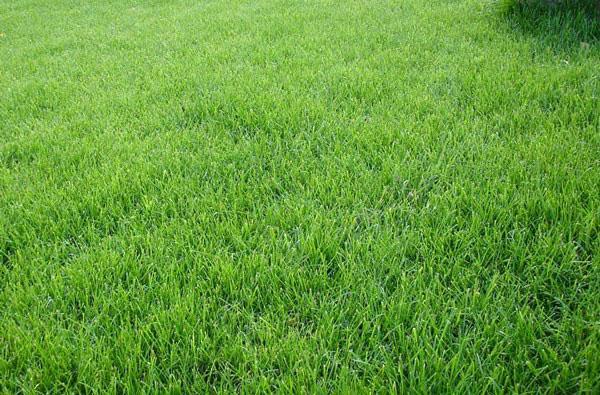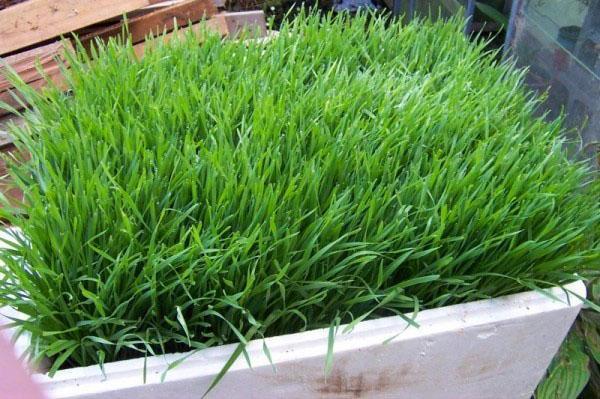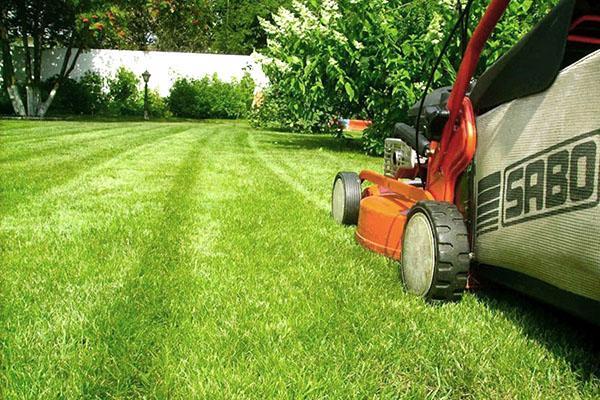Choosing a bluegrass lawn for a summer cottage
 The bluegrass lawn is a fairly common way of decorating a personal plot. A thick and even carpet of grass looks very beautiful in the country, in the courtyard of a private house and near an office building. If you decide to transform the territory, then you should pay special attention to the choice of grass. What the bluegrass looks like can be seen in the photo below.
The bluegrass lawn is a fairly common way of decorating a personal plot. A thick and even carpet of grass looks very beautiful in the country, in the courtyard of a private house and near an office building. If you decide to transform the territory, then you should pay special attention to the choice of grass. What the bluegrass looks like can be seen in the photo below.
Read also See the article about roll lawn!
Bluegrass - the grass that changes everything around

To make the lawn look brighter in color, it is worth sowing the bluegrass more densely.
Covering the soil with a dense carpet, the grass protects it from adverse environmental factors. The plant feels great in different climatic conditions and on any soil composition. After the grass reaches four centimeters in height, it needs to be cut. Due to the fact that the leaves grow vertically, the grass is easy to cut. If done correctly, the lawn will be even denser and spread throughout the entire territory.
Bluegrass is unpretentious in care and resistant to most diseases. The period of active growth falls in the spring. The plant reaches adulthood in 4 years. Before winter, the lawn is not cut, but is left 10 centimeters high in order to protect the root system during an unfavorable period.
 In order for the grass to be always beautiful, do not forget about combing the lawn. The procedure is carried out with a metal brush. This is necessary in order to remove debris and dry leaves. In places where the lawn has become bald, it is worth adding soil, thus providing a place for the grass to grow. In winter, if a crust has formed on the lawn, it will need to be removed for the plant to breathe.
In order for the grass to be always beautiful, do not forget about combing the lawn. The procedure is carried out with a metal brush. This is necessary in order to remove debris and dry leaves. In places where the lawn has become bald, it is worth adding soil, thus providing a place for the grass to grow. In winter, if a crust has formed on the lawn, it will need to be removed for the plant to breathe.
Knowing how many years meadow bluegrass lasts for a lawn, you can grow a beautiful lawn. With proper care, the grass cover will delight with its neatness for 15 years.
Plant species
 Bluegrass is a perennial herb that has several varieties. All species differ not only in appearance, method of cultivation, but also in endurance.
Bluegrass is a perennial herb that has several varieties. All species differ not only in appearance, method of cultivation, but also in endurance.
The main varieties of meadow bluegrass:
- "Midnight". The grass is used for the lawns of football fields, as it is resistant to various parasites and diseases. The peculiarity of this plant is that it does not wrinkle and copes well with various loads.

- "Collection". This variety has proven itself well both for flower bed decoration and for decoration of sports grounds. Plants form a medium cover density. The grass is also distinguished by a small width of deciduous plates and a rich shade.

- "Horses". A plant suitable for creating flower beds. This species of meadow bluegrass is distinguished by its slow growth and good disease resistance.

- Dolphin. It is a lawn bluegrass suitable for tennis courts.

- "Panduro". Disease resistant variety. When properly fitted, it has a beautiful appearance and is durable.

- Platini. The grass is easy to care for and grows quickly.Due to its endurance to stress, Platini is often used to create football pains.

- "Compact". It is an artificially bred variety that is drought tolerant.

- Geronimo. The grass forms a dense web. The leaves are bright, small in size.

- "Boutique". Beautiful and dense grass that blends well with other lawn plants.

No less popular varieties of meadow bluegrass for creating lawn is "Balin".
 It tolerates frost well, retaining a bright green color. Grass is used to decorate sports grounds. "Balin" is a plant that blooms early and has an average rooting power.
It tolerates frost well, retaining a bright green color. Grass is used to decorate sports grounds. "Balin" is a plant that blooms early and has an average rooting power.
Choosing the right seeds
 The market now abounds with a variety of grass mixtures for lawn planting. But, if you want to create a beautiful site, then it is recommended to choose quality seeds.
The market now abounds with a variety of grass mixtures for lawn planting. But, if you want to create a beautiful site, then it is recommended to choose quality seeds.
Before you buy planting material, you should check its germination. The first thing to do is look at the packaging. The product must be certified in your country and in the international market. Also, choose seeds that are suitable for your area and the type of lawn you want.
 For those who want to make a classic flower bed, one bluegrass variety is suitable, if the sports field is a special one. Once you've decided on your lawn type, buy some seeds and try planting them. It is not necessary to do this in the soil, you can put the grains pre-soaked with boiling water between the layers of sawdust and send them to a warm place. After a few days, you will see if the seeds will sprout. Instead of shavings, it is allowed to use two wipes moistened with water. To determine the quality of the seeds, you can fill them with water for 10 minutes. Good planting material will remain at the bottom, and bad planting material will float.
For those who want to make a classic flower bed, one bluegrass variety is suitable, if the sports field is a special one. Once you've decided on your lawn type, buy some seeds and try planting them. It is not necessary to do this in the soil, you can put the grains pre-soaked with boiling water between the layers of sawdust and send them to a warm place. After a few days, you will see if the seeds will sprout. Instead of shavings, it is allowed to use two wipes moistened with water. To determine the quality of the seeds, you can fill them with water for 10 minutes. Good planting material will remain at the bottom, and bad planting material will float.
How to plant a bluegrass lawn
 Experts note that planting this grass is quite simple, and the measures for caring for it are also not difficult. Before planting meadow bluegrass, you should know the basic rules. If you follow all the recommendations, the lawn will delight you with its appearance for a long time.
Experts note that planting this grass is quite simple, and the measures for caring for it are also not difficult. Before planting meadow bluegrass, you should know the basic rules. If you follow all the recommendations, the lawn will delight you with its appearance for a long time.
The bluegrass has a powerful root system that is able to regenerate even after severe damage.
Sequencing:
- Before planting meadow bluegrass, you need to prepare the substrate. It is best to choose slightly acidic loamy soils. To get a beautiful thick lawn, you first need to dig up the ground and remove weeds... Next, calcify, tamp and level the soil, and only after that start sowing the seeds.

- It is best to carry out the procedure with a lawn seeder, but if it is not there, then you need to do it manually. First, the grains are distributed along and then across the site. This is done to avoid bald areas. It is recommended to sprinkle the soil together with the seeds fertilizer, which contains nitrogen and potassium. The seeding rate of meadow bluegrass is from 10 to 15 grams per 1 m2.

- The next step will be to compact the soil already with seeds for better fixing. Grains and fertilizer are conveniently distributed with a roller and rake. The planting depth should be approximately 2 mm.

It is important to provide the future lawn with plenty of light for its rapid growth. Therefore, choose an open area for your lawn. In the first year, bluegrass grows very slowly, only after a month the first blades of grass appear and gradually the surface of the earth is covered with bushes. You can propagate bluegrass by dividing the bush. They sit down at a short distance from each other. It will take only two months for there to be no gaps between them.
Bluegrass lawn: care rules
 Irrigation. The first weeks after sowing, bluegrass should be watered daily for 10 minutes. We repeat this procedure until grass shoots. At the same time, it is forbidden to walk in the place of the future lawn. Further watering carried out as needed.
Irrigation. The first weeks after sowing, bluegrass should be watered daily for 10 minutes. We repeat this procedure until grass shoots. At the same time, it is forbidden to walk in the place of the future lawn. Further watering carried out as needed.
 Air temperature. This is an important point in grass care. Bluegrass generally tolerates temperature fluctuations well. However, if you notice that the grass has begun to turn yellow and dry, it means that it lacks moisture. It is necessary to provide full watering if there is no rain and the weather is dry and hot.
Air temperature. This is an important point in grass care. Bluegrass generally tolerates temperature fluctuations well. However, if you notice that the grass has begun to turn yellow and dry, it means that it lacks moisture. It is necessary to provide full watering if there is no rain and the weather is dry and hot.
 Lawn formation. Regular mowing of bluegrass is the key to its growth and splendor. In the event of bald patches, new seeds will need to be planted. If everything is done correctly, then in a month new shoots will appear.
Lawn formation. Regular mowing of bluegrass is the key to its growth and splendor. In the event of bald patches, new seeds will need to be planted. If everything is done correctly, then in a month new shoots will appear.
 Pests. Only moles are terrible for bluegrass, since they undermine the sod from below and can violate the integrity of the plants. If this happened, then the situation can be corrected by leveling the soil with a rake and sowing it with new seeds.
Pests. Only moles are terrible for bluegrass, since they undermine the sod from below and can violate the integrity of the plants. If this happened, then the situation can be corrected by leveling the soil with a rake and sowing it with new seeds.
 Fertilizer. To maintain the beauty of the lawn, due attention should be paid to feeding the bluegrass. It is best to opt for organic fertilizers. Experts advise to feed the lawns with nutrients all the time. Thus, you will get beautiful, well-groomed and dense grass that will delight the eye for a long time.
Fertilizer. To maintain the beauty of the lawn, due attention should be paid to feeding the bluegrass. It is best to opt for organic fertilizers. Experts advise to feed the lawns with nutrients all the time. Thus, you will get beautiful, well-groomed and dense grass that will delight the eye for a long time.
As a top dressing, it is better to purchase nutritional mixtures that contain herbicides. So you will not only "feed" the lawn, but also fight weeds in parallel.
In autumn and spring, the fertilizer should be spread over the lawn in a thin layer. When the grass and soil become wet due to rain or melted snow, nutrients from fertilizers will fall into the ground and make it nutritious.
Compatibility with other herbs
 Bluegrass gets along well with other cereal plants. Good neighbors for such a grass will be pasture ryegrass, meadow fescue, white field grass, red fescue, thin field grass and others.
Bluegrass gets along well with other cereal plants. Good neighbors for such a grass will be pasture ryegrass, meadow fescue, white field grass, red fescue, thin field grass and others.
For example, red fescue, along with bluegrass, is great for strengthening slopes by braiding and spreading roots. This mix is considered the most successful because it can grow in different conditions and in almost any type of soil. In addition, this lawn will be equally functional both in the park and on the football field.
Knowing what meadow bluegrass is and what types of it are, you can create a real dream lawn. At the same time, it is important to observe all the subtleties of choosing seeds, the technology of planting them in the ground, as well as proper care for adult grass. And then you will enjoy the result.